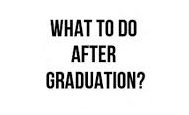
What To Do After Graduation?!
 I want to talk about, what comes next after graduation? Because for a lot of us, this can be one of the scariest ages of our life because there’s immense pressure to accomplish so much and a feeling like, in many cases, you don’t even really know what you want yet.
I want to talk about, what comes next after graduation? Because for a lot of us, this can be one of the scariest ages of our life because there’s immense pressure to accomplish so much and a feeling like, in many cases, you don’t even really know what you want yet.
First, you’ll really want to know, what are the things that are ultimately important to you in life?
Maybe you’re not going to know right away. But you can start to form a few core ideas of the things that you really value and want to prioritize the kind of lifestyle you want to be living, whether or not it’s important for you to have a family, to live in a certain place, to have a certain kind of job. They’re not all necessarily mutually exclusive.
But it’s hard to focus on many goals at the same time. Coming up with a few core values and principles will help guide you in the right direction. And it’s also very important, to be honest with yourself about what truly makes you fulfilled. And I say “fulfilled” and not “happy” because many times the things that make you fulfilled in the long term are not going to be the things that always feel happiest in the short term.
So what have we hopefully learned in this “Guide to Getting Good With Money for College Students”?
Number One
Now is the best time to start creating and keeping financial habits. It’s easy to think of college as a free space, or young adulthood as the time when nothing really matters and you can put off all that serious stuff until later in adult life. But that is the wrong tract to think about it. And the more you delay taking yourself seriously, the harder every year is going to be.
You’re robbing your future self by not taking advantage of the opportunity of being young. As we mentioned earlier, having this amazing horizon on things like your investments, or time to save, or time to plan ahead for bigger goals, is such an amazing gift. Don’t waste it.
Number Two
Learning to evaluate all of your financial decisions, from what your savings goals are, to items you might be buying in the store and price comparing, to where you want to live and what you want to spend money on, is a skill that you need to develop. You need to learn how to assess things by cost per use and value to the quality of life and determine what is really worth it.
Every dollar you spend should have real value and meaning. And by thinking critically just a little bit about some of these financial decisions, you can be sure to stop feeling that sense of buyer’s remorse or potentially making mistakes with your money.
Number Three
Being financially healthy doesn’t mean you’re always going without or choosing the cheapest option or being extraordinarily frugal at all costs. Sometimes you will splurge and indulge and buy things that aren’t necessarily “important” or necessary.
It just means that when you’re making these decisions, you know you can afford to make them and they’re weighed out against other things. Part of the reason that I called TFD “The Financial Diet” in the first place is that I believe any healthy financial diet is like a healthy eating diet. It should be something that is sustainable every day for the rest of your life.
And you’ll never completely cut out a single category or a certain type of food.
You’ll just say, there are a time and a place for everything. And you want to enjoy your big slice of cake so you’re not going to eat cake all day every day. A lot of times, you’re going to have vegetables, and then the cake will be so much more delicious.
Number Four
Learn everything you can about any financial transaction you’re entering into before signing on the dotted line. We’re all going to have different financial resources and different options available to us. But one thing that we can all give ourselves is the gift of being informed about what we’re agreeing to. Nothing is preventing you from reading the terms of a student loan or knowing the difference between two investment accounts or shopping around for different banks or credit cards based on which ones are going to be the most beneficial to you.
If you’re informed enough to understand the things that you’re choosing between and to make the best decision for yourself with your eyes wide open, it may not make it automatically an easy financial decision, but it will at least be one that you can sleep well at night with because you understood what you were getting yourself into.
Lastly,
You do not need everything figured out the second that a diploma is in your hands. Learning how to build the best and strongest financial life is a lifelong process. And it’s inevitable that you’re going to make mistakes or start out on paths that you decide ultimately isn’t for you. But the point is just that you’re creating a space in which you are constantly learning, improving, and building on what you already know.
I believe that anyone has the power to inform themselves and transform their relationship to money to be healthy and as unemotional as possible and about building the life that they want to live.
Money in the best hands is a tool. But money in uninformed hands is often a weapon and a weapon with which you can really hurt yourself, as I often did.

Leave a Reply